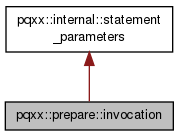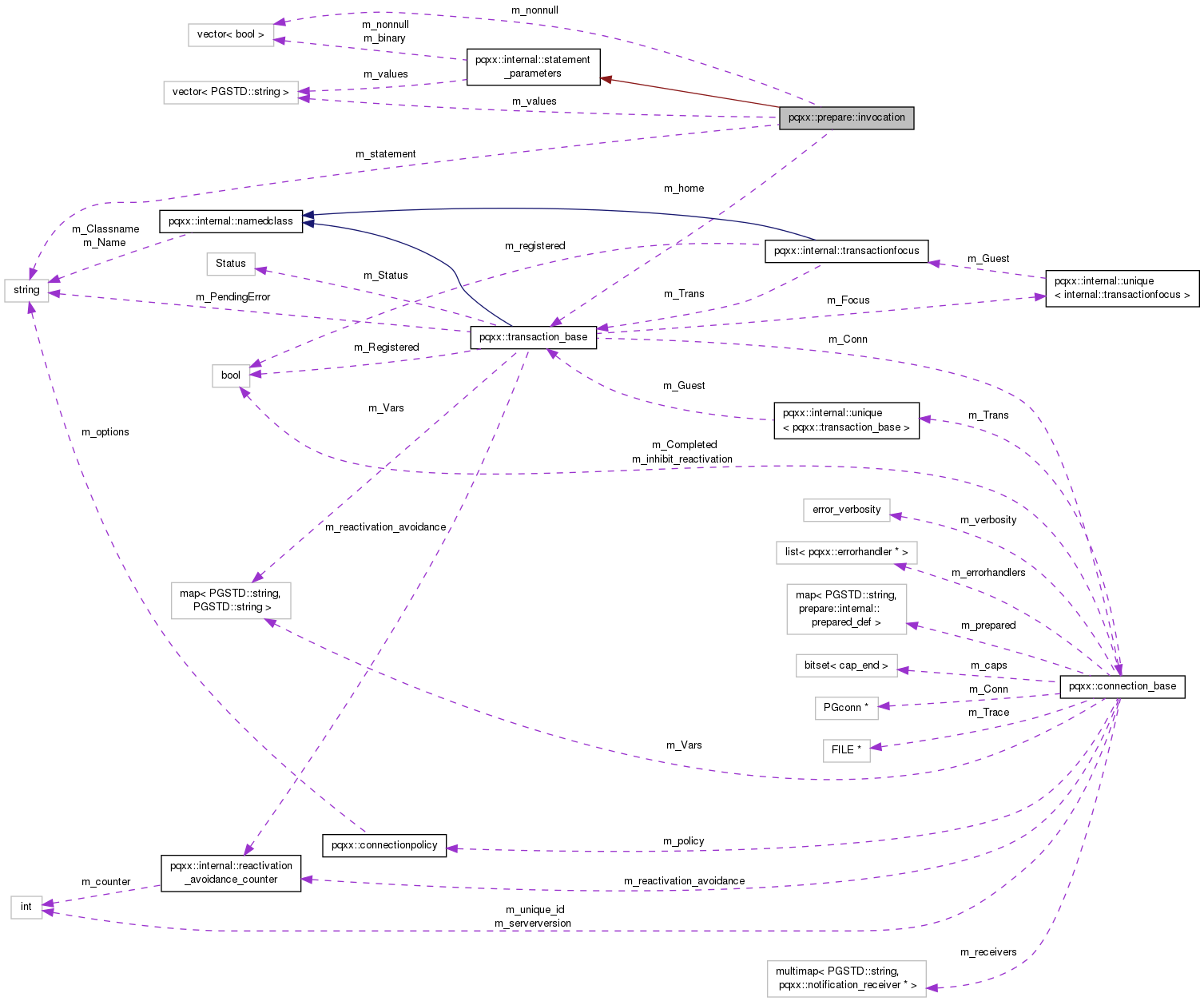Helper class for passing parameters to, and executing, prepared statements.
More...
#include <prepared_statement.hxx>
Helper class for passing parameters to, and executing, prepared statements.
| pqxx::prepare::invocation::invocation |
( |
transaction_base & |
, |
|
|
const PGSTD::string & |
statement |
|
) |
| |
| void pqxx::internal::statement_parameters::add_binary_param |
( |
const binarystring & |
b, |
|
|
bool |
nonnull |
|
) |
| |
|
inlineprotectedinherited |
| void pqxx::internal::statement_parameters::add_param |
( |
| ) |
|
|
inlineprotectedinherited |
template<typename T >
| void pqxx::internal::statement_parameters::add_param |
( |
const T & |
v, |
|
|
bool |
nonnull |
|
) |
| |
|
inlineprotectedinherited |
| result pqxx::prepare::invocation::exec |
( |
| ) |
const |
| bool pqxx::prepare::invocation::exists |
( |
| ) |
const |
Has a statement of this name been defined?
Marshall parameter values into C-style arrays for passing to libpq.
| invocation& pqxx::prepare::invocation::operator() |
( |
| ) |
|
|
inline |
template<typename T >
| invocation& pqxx::prepare::invocation::operator() |
( |
const T & |
v | ) |
|
|
inline |
Pass parameter value.
- Parameters
-
| v | parameter value; will be represented as a string internally. |
Pass binary parameter value for a BYTEA field.
- Parameters
-
| v | binary string; will be passed on directly in binary form. |
template<typename T >
| invocation& pqxx::prepare::invocation::operator() |
( |
const T & |
v, |
|
|
bool |
nonnull |
|
) |
| |
|
inline |
Pass parameter value.
- Parameters
-
| v | parameter value (will be represented as a string internally). |
| nonnull | replaces value with null if set to false. |
Pass binary parameter value for a BYTEA field.
- Parameters
-
| v | binary string; will be passed on directly in binary form. |
| nonnull | determines whether to pass a real value, or NULL. |
template<typename T >
| invocation& pqxx::prepare::invocation::operator() |
( |
T * |
v, |
|
|
bool |
nonnull = true |
|
) |
| |
|
inline |
Pass C-style parameter string, or null if pointer is null.
This version is for passing C-style strings; it's a template, so any pointer type that to_string accepts will do.
- Warning
- Be very careful with the special constant
NULL! Since NULL in C++ is an int, not a pointer, a value of NULL would cause the wrong version of this template to be invoked. To all intents and purposes it would look like you were trying to pass a regular zero as an integer value, instead of a null string. This is not a problem with pointer variables that may happen to be NULL, since in that case the value's type is not subject to any confusion. So if you know at compile time that you want to pass a null value, use the zero-argument version of this operator; if you don't want to do that, at least add a second argument of false to make clear that you want a null, not a zero.
- Parameters
-
| v | parameter value (will be represented as a C++ string internally) |
| nonnull | replaces value with null if set to false |
| invocation& pqxx::prepare::invocation::operator() |
( |
const char * |
v, |
|
|
bool |
nonnull = true |
|
) |
| |
|
inline |
Pass C-style string parameter, or null if pointer is null.
This duplicates the pointer-to-template-argument-type version of the operator, but helps compilers with less advanced template implementations disambiguate calls where C-style strings are passed.
| invocation& pqxx::prepare::invocation::setparam |
( |
const PGSTD::string & |
, |
|
|
bool |
nonnull |
|
) |
| |
|
private |
| PGSTD::vector<bool> pqxx::prepare::invocation::m_nonnull |
|
private |
| const PGSTD::string pqxx::prepare::invocation::m_statement |
|
private |
| PGSTD::vector<PGSTD::string> pqxx::prepare::invocation::m_values |
|
private |
The documentation for this class was generated from the following file:

